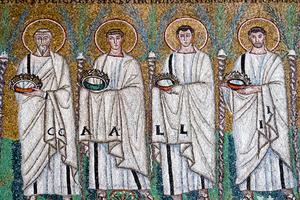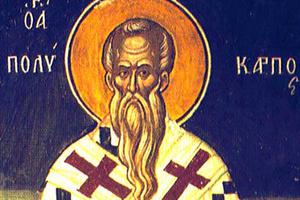God Gave St. Polycarp a Place in the Company of Martyrs
The great second-century bishop faced his violent death with legendary courage.

I am never more humbled by the courageous witness of the martyrs than when I reflect on their lives during my day-to-day struggles. Just as I am tempted to silently praise my own small mortifications, I remember instead the ultimate sacrifice made willingly, even joyfully, by our Church’s brave martyrs.
St. Polycarp — a second-century martyr, bishop of Smyrna and disciple of St. John the Apostle — is counted among this elect number. As one of the second generation of Christians, it fell to Polycarp and his fellow bishops to defend the fledgling Christian faith from new heresies springing up in the absence of the apostles, who were no longer alive to confirm teachings and provide their eyewitness accounts.
Polycarp rose to this challenge brilliantly, becoming a theological giant in his age and a great teacher to the early bishops, St. Ignatius of Antioch among them. He wrote dozens of epistles and sermons and traveled widely, encouraging his fellow Christians and preaching the Gospel while firmly crushing the strains of heresy that threatened the Church.
In one letter to the Philippians, he wove orthodoxy with the hope of Christians, writing:
For everyone who shall not confess that Jesus Christ is come in the flesh, is antichrist, and whosoever shall not confess the testimony of the Cross, is of the devil; and whosoever shall pervert the oracles of the Lord to his own lusts and say that there is neither resurrection nor judgment, that man is the firstborn of Satan. Let us therefore, without ceasing, hold fast by our hope and by the pledge of our righteousness. … Jesus Christ, who took up our sins in His own body upon the cross. … or our sakes, [Christ] endured all things, so that we might live in him.
The bravery and faith with which Polycarp lived would be overshadowed only by the courage with which he faced his violent death. At 86 years old, he was captured by Roman guards sent to hunt him down. Old but unyielding, he entered the arena, where the proconsul, uncomfortable at the thought of executing an old man, begged the holy bishop to renounce his faith and save his life. Polycarp calmly replied:
How then can I blaspheme my King and Savior? You threaten me with a fire that burns for a season, and after a little while is quenched; but you are ignorant of the fire of everlasting punishment that is prepared for the wicked.
Urged on by the bloodthirsty crowd in the arena, the proconsul ordered for the fire to be lit. Accepting his fate, Polycarp gave his final statement:
I bless you, Father, for judging me worthy of this hour, so that in the company of the martyrs I may share the cup of Christ.
But God had saved one more miracle for the bishop’s earthly life. As the flames burned forth, they formed an archway around Polycarp, leaving him untouched. Horrified, his captors stabbed him to death, and his blood poured forth, quenching the flames. Immediately upon his martyrdom the Church venerated him as a saint.
Polycarp’s gigantic faith and superhuman bravery could be a rebuke to me as I muddle through my own pedestrian sacrifices. How much could such small offerings matter when weighed against the steely-eyed courage of an elderly bishop defeating heretics and facing the flames?
But such thoughts are once again mine, products of my determination to prove myself, and not of God. God did not ordain that I should be born in the time of the early martyrs. He determined that I belonged here, now. I cannot know why I was preserved from the bloody persecution of the arena, or why I was blessed with living in a place where I can freely practice my faith. But I do know that God did not deem it so because he did not want me to be a great saint. He simply wants my path to heaven to be different. He asks that my love be returned to him in a thousand different ways a day, often small and rarely worthy of recording.
The martyrs are great not because they died, but because they joyfully submitted to God’s call for them. So too are we called to be great, to answer with joy in every moment the duty God has placed before us, to sacrifice not just our comforts, but our plans as well, so that we may unite our will with his.
St. Polycarp, pray for us!
- Keywords:
- st. polycarp
- martyrs
















